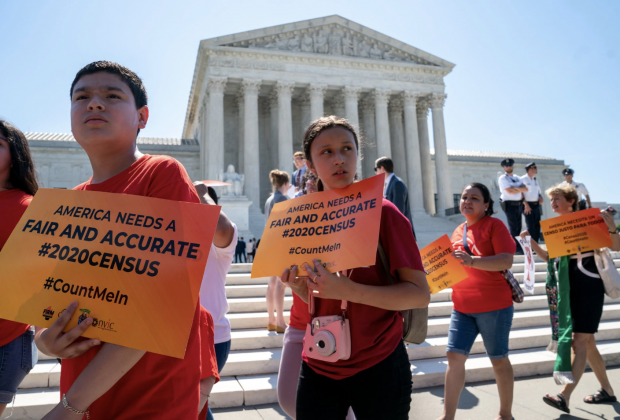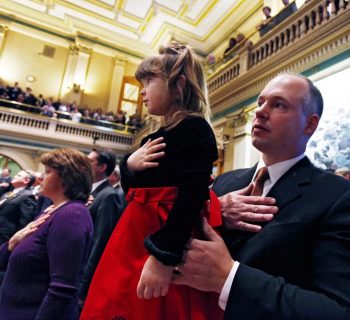By: Michael Wines~ The New York Times~ July 2, 2019
The Trump administration, in a dramatic about-face, abandoned its quest on Tuesday to add a citizenship question to the 2020 census, a week after being blocked by the Supreme Court.
Faced with mounting deadlines and a protracted legal fight, officials ordered the Census Bureau to start printing forms for next year’s headcount without the question.
The decision was a victory for critics who said the question was part of an administration effort to skew the census results in favor of Republicans. It was also a remarkable retreat for an administration that typically digs into such fights.
Just last week after the Supreme Court’s decision, President Trump said he was asking his lawyers to delay the census, “no matter how long,” in order to fight for the question in court. He reiterated his unwillingness to give up in a Twitter message posted late Tuesday, saying he had asked administration officials “to do whatever is necessary” to get a citizenship question on the census form.
Word of the administration’s decision to stop fighting came in a one-sentence email from the Justice Department to lawyers for plaintiffs in a New York lawsuit that sought to block the question’s inclusion in the headcount.
The email offered no explanation, but the administration was confronting weeks or months of additional legal challenges to the question. Meanwhile, the Census Bureau had said it needed to begin printing questionnaires by July 1 to meet the April 2020 deadline for conducting the census.
The administration’s decision appeared to end a yearlong battle over the country’s all-important decennial headcount. Census results are used to divvy up seats in the House of Representatives and to draw political maps at all levels of government. They are also used to allot federal funding for key social services.
The addition of a citizenship question to the census could have had profound implications for American politics. Officials at the Census Bureau itself have said that including the question would lead to an undercount of noncitizens and minority residents. As a result, areas with more immigrants, which tend to vote Democratic, could have lost both representation and federal funding.
The Supreme Court last week rejected the administration’s stated reason for adding a question on citizenship to the census, and while the decision was not a conclusive ruling, the justices placed a daunting hurdle before the government.
Commerce Secretary Wilbur Ross said in a statement on Tuesday night that he respected the Supreme Court but strongly disagreed with its ruling.
“The Census Bureau has started the process of printing the decennial questionnaires without the question,” he said. “My focus and that of the Bureau and the entire Department is to conduct a complete and accurate census.”
Dale Ho, director of the Voting Rights Project at the American Civil Liberties Union, which was among the plaintiffs trying to block the question, praised the outcome, saying the Supreme Court left the administration with “no choice but to proceed with printing the 2020 census forms without a citizenship question.”
As drafted by the administration, the census would have asked: “Is this person a citizen of the United States?” Options were to include: “Yes, born in the United States”; “Yes, born in Puerto Rico, Guam, the U.S. Virgin Islands, or Northern Marianas”; “Yes, born abroad of U.S. citizen parent or parents”; “Yes, U.S. citizen by naturalization”; or “No, not a U.S. citizen.”
For the last year, there has been a bitter legal battle over whether the Commerce Department broke the law when it decided in March 2018 to tack a citizenship question onto the census, long after other aspects of the questionnaire had been finalized.
The department, which oversees the Census Bureau, had argued that the Justice Department needed a more accurate count of citizens to enforce the 1965 Voting Rights Act, but three lower courts ruled that that was an obvious pretext for some other unstated goal.
The files included a study in which Mr. Hofeller concluded that a citizenship question was central to a strategy to increase Republican political power by excluding noncitizens and persons under voting age from the census figures used for drawing new political boundaries in 2021.
The disclosure led to the reopening of one of the lawsuits opposing the question, and plaintiffs were scheduled to begin new efforts this month to prove that the question was an effort to discriminate against Hispanics for political gain.
On Tuesday, the Mexican American Legal Defense and Educational Fund, which represents plaintiffs in that suit, indicated that it was unwilling to end the lawsuit without further assurances from the administration that the issue of the citizenship question had in fact been fully resolved.
Thomas A. Saenz, the organization’s president, and general counsel said his group wanted to make sure there was not any misinformation spread about there still being a citizenship question.
“No matter what happens, there’s still a lingering hardship from how long the administration had this hanging out there, and the publicity it got,” he said.
Opposition to the citizenship question was rooted among local governments and advocacy groups representing ethnic minorities, all of whom feared that the question’s mere presence on the census would deter noncitizens and even legal immigrants from filling out the form for fear of government retaliation.
The groups’ victory on Tuesday may have eased that threat, but hardly eliminated it. The public controversy over the issue has already stirred fears of retribution among many immigrants, who say they will avoid filling out the census form even if the question is not asked.
“Now is the time to shift gears and begin robust education and outreach campaigns to ensure each person in this country is counted,” said Letitia James, the attorney general of New York, which was also among the plaintiffs suing to block the question. “Everyone counts, therefore everyone must be counted.”
Source: Michael Wines~ The New York Times~ July 2, 2019







